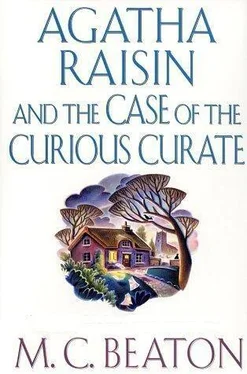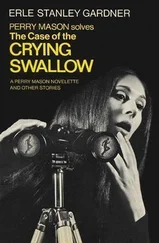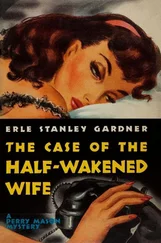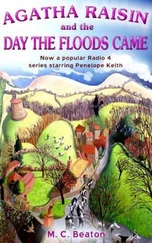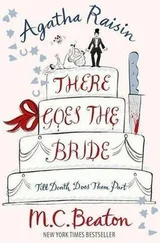M.C. Beaton - The Case of the Curious Curate
Здесь есть возможность читать онлайн «M.C. Beaton - The Case of the Curious Curate» весь текст электронной книги совершенно бесплатно (целиком полную версию без сокращений). В некоторых случаях можно слушать аудио, скачать через торрент в формате fb2 и присутствует краткое содержание. Жанр: Старинная литература, на английском языке. Описание произведения, (предисловие) а так же отзывы посетителей доступны на портале библиотеки ЛибКат.
- Название:The Case of the Curious Curate
- Автор:
- Жанр:
- Год:неизвестен
- ISBN:нет данных
- Рейтинг книги:5 / 5. Голосов: 1
-
Избранное:Добавить в избранное
- Отзывы:
-
Ваша оценка:
- 100
- 1
- 2
- 3
- 4
- 5
The Case of the Curious Curate: краткое содержание, описание и аннотация
Предлагаем к чтению аннотацию, описание, краткое содержание или предисловие (зависит от того, что написал сам автор книги «The Case of the Curious Curate»). Если вы не нашли необходимую информацию о книге — напишите в комментариях, мы постараемся отыскать её.
The Case of the Curious Curate — читать онлайн бесплатно полную книгу (весь текст) целиком
Ниже представлен текст книги, разбитый по страницам. Система сохранения места последней прочитанной страницы, позволяет с удобством читать онлайн бесплатно книгу «The Case of the Curious Curate», без необходимости каждый раз заново искать на чём Вы остановились. Поставьте закладку, и сможете в любой момент перейти на страницу, на которой закончили чтение.
Интервал:
Закладка:
“What’s your name again?”
“John Armitage.”
Her pale lips parted in a smile. “Why, I saw you on the South Bank Show last year. Please come in. This is exciting.”
Hardly the grieving sister, thought Agatha sourly as she followed John into the cottage.
“I’m just making an inventory of everything,” said Mrs. Essex. “Poor Ruby never spent much on herself.”
Ruby, thought Agatha. So that was her first name. Momentarily distracted, she began to wonder about the first names of other women in the ladies’ society where the tradition was to use second names.
Then she realized John was speaking. “Your sister phoned Mrs. Bloxby, the vicar’s wife, asking her to call round as she had something to tell her, but by the time Mrs. Bloxby got here, your sister was dead. Did Miss Jellop say anything at all to you that might indicate she knew something dangerous about someone?”
“No, because we didn’t speak. We had a falling-out. I was amazed when the police told me they had found Ruby’s will and that she had left everything to me. In fact, she had changed her will the day before she died.”
Agatha’s bearlike eyes gleamed. “Who had she left her money to in the previous will?”
“To that curate. The one who was murdered. Poor Ruby. She was always getting these schoolgirl crushes on some man or another.”
“And you didn’t know anything about it?” asked Agatha.
Those protruding eyes fastened on Agatha’s face with a flash of malicious intelligence. “Meaning did I murder my sister the minute I knew she’d changed her will? You should leave detecting to your friend here.”
“Might there be something among her papers?” put in John quickly. “Letters or diary or something?”
“You’ll need to ask the police. They took all her papers away. Now, if you’ll excuse me, I have a lot to do.”
“Will you sell the cottage?” asked Agatha.
“I don’t know. Maybe keep it for holidays and weekends. My husband’s due to retire soon.”
“When did you last speak to your sister?” asked Agatha.
“Must have been about three years ago.”
“Not much there,” said John gloomily as they walked back down through the village. “You know, the car has caused a decline in gossip in English villages. I suppose not so long ago one would see people standing gossiping and walking about. Now a lot of them even use their cars to drive a few yards to the village stores.”
“But that means empty roads and lanes,” said Agatha impatiently. “Surely a stranger would have been noticed. Unless it was someone masquerading as a local reporter. The village is fed up with the press. They see someone that looks like a journalist and they shy away. I can tell a genuine journalist a mile off.”
“How?”
“Even if they’re well-dressed, they carry a shabby sort of people-pleasing alcoholism about with them.”
“You’re sour because you were a public relations officer.”
“You’re right,” said Agatha reluctantly. “I hated crawling to the bastards.”
“I can’t imagine you crawling,” said John. “I can imagine you frightening them into writing what you wanted them to write.”
This was in fact true but Agatha didn’t want to hear it or believe it. She still saw herself as a waiflike creature – shy, vulnerable and much put-upon. Sometimes when she looked in a full-length mirror, she could not believe that the stocky, well-groomed woman looking back at her was really herself.
They walked on in silence and then Agatha said, “What next?”
“Just keep on trying. London tomorrow.”
∨ The Case of the Curious Curate ∧
6
You look very nice,” commented John when Agatha got into his car the next morning. Agatha was wearing a silky gold jersey suit. It had a short skirt. Her best feature, her legs, were encased in sheer tights and her feet in high-heeled sandals.
“Thanks,” said Agatha gruffly. She had decided it was time she started dressing up again, not, she told herself, that this sudden desire to smarten her appearance had anything to do with John Armitage. She wished she had elected to drive them herself. There was something about John doing all the driving that was making her feel diminished. Agatha liked to feel in charge at all times. Subconsciously she had felt that putting on her best clothes might prompt some sexual interest in her from John, and in that way, she would have the upper hand. But what Agatha’s subconscious decided hardly ever reached the conscious part of her brain.
“Look at that dreadful advertisement,” exclaimed John, driving along the M40.
“What? Where?”
“We passed it. It said, ‘Only ninety-one shopping days to Christmas.’ ”
“The shops are full of Christmas crackers and wrapping already,” said Agatha. “The adults have ruined Christmas for the children with all this commercialism.”
“Wrong. The children have ruined Christmas for the adults.”
Agatha looked at him, puzzled. “How do you explain that?”
“They’ve come to expect to get exactly what they want. I know all this from friends of mine with children. Something new comes out in July, say. They clamour for it. No use saying, ‘Wait till Christmas.’ They have to have it right away because it’ll be old hat by Christmas. They don’t want surprises. They want what they demand. So there are no shining faces under the Christmas tree, radiant with surprise and gratitude. Only complaints like, ‘Why did you buy me this computer game? It’s months old.’ Greedy children and disappointed parents, that’s Christmas.”
“But surely it’s the parents’ fault. Can’t they put their foot down and say, ‘You’ll get what we give you and nothing costing more than five pounds’?”
“And never, ever be forgiven? It’s the kids these days who have to keep up with the Joneses. They don’t want to go back to school after the holidays and be unable to compete with the others. I’m going away for Christmas.”
“Where?”
“Don’t know. Stick a pin in the map.”
“I’ll probably go away somewhere myself, but only for a short time. I don’t like leaving my cats.”
“Your cats seem to adore Doris Simpson.”
“They’re my cats!”
“Possessive, aren’t you? We may as well think of going somewhere together.”
“Why?”
“Well, why not? Unless you prefer to go places on your own.”
“Actually, I like my own company when I’m travelling.”
“Suit yourself. I’ll find someone else. Look at that idiot in front, veering from lane to lane like a maniac.”
I should grow up, mourned Agatha. It would have been nice to have company. Why did I get miffed because he didn’t say anything affectionate? Why should he? Why should I want him to?
She ruthlessly shifted her mind onto the problems of the Carsely murders. Why had John decided that Tristan was gay? Jealousy? Agatha thought back to that dinner. She had largely blotted it out of her mind because of that final rejection. No, he had not struck her as gay. She was sure he masqueraded as one to lead women on and then rebuff them. Perhaps he had lured men on and then told them he was heterosexual. It could be that he had behaved himself while at the church in South Ken. Could he have been twisted and spoilt by his exceptional looks? Hardly. There must have been something twisted in him from the beginning.
How did those journalists that she had been so bitchy about cope with day-to-day rejections and dead ends? Perhaps she should have been nicer to them during her career as a public relations officer. Perhaps, had she done so, she might have been even more successful.
Agatha hardly ever questioned her own behaviour, but this rare introspection was caused by a longing to forget about the whole case. She felt obscurely that it was because John kept taking over. He didn’t have to suffer from the same setbacks as she did. People mostly recognized his name and were prepared to speak to him. And because he was a man, she thought sourly. Men investigated. Women were regarded as interfering. Had women’s lib all been a myth? All that seemed to have been achieved was that women were expected to work as well as raise families. Respect for women had gone.
Читать дальшеИнтервал:
Закладка:
Похожие книги на «The Case of the Curious Curate»
Представляем Вашему вниманию похожие книги на «The Case of the Curious Curate» списком для выбора. Мы отобрали схожую по названию и смыслу литературу в надежде предоставить читателям больше вариантов отыскать новые, интересные, ещё непрочитанные произведения.
Обсуждение, отзывы о книге «The Case of the Curious Curate» и просто собственные мнения читателей. Оставьте ваши комментарии, напишите, что Вы думаете о произведении, его смысле или главных героях. Укажите что конкретно понравилось, а что нет, и почему Вы так считаете.
